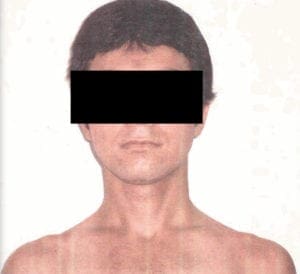As Presidential Candidates Promise to Use Torture, Pentagon Releases Photos of Detainee Abuse
This article was featured in our weekly newsletter, the Liberator Online. To receive it in your inbox, sign up here.
The Pentagon recently released nearly 200 photos related to its investigation into the US use—and abuse—of torture against detainees in Iraq and Afghanistan. According to The Intercept, the released images are the most innocuous of the more than 2,000 images the government has been fighting to keep confidential.
The pictures were taken between 2003 and 2006. Most of them are close-up shots of detainees’ limbs. Some of them show scabs or bruises. Faces are covered with black bars to keep the detainees’ identities under wraps.

According to government attorneys, the release of the 2,000 photos documenting the abuse would harm national security. Admitting that the actions perpetrated by US forces against detainees are used as a recruitment tool, government attorneys have argued that the release of the bulk of images would be used as propaganda by the Islamic State or al Qaeda.
In 2004, the American Civil Liberties Union (ACLU) filed a Freedom of Information Act lawsuit to force the Defense Department to release the 2,000 photographs in the agency’s possession. The request was filed after images from the prison at Abu Ghraib leaked.
According to Vice News, many of the unreleased images show soldiers posing with dead bodies, while others show soldiers punching and kicking prisoners. Many allegedly show detainees stripping naked next to female guards. None of those incidents were documented in the 198 photos released by the Pentagon in response to ACLU’s lawsuit.
To Katherine Hawkins, the senior counsel at the Constitution Project, released images “are only about 10 percent, and presumably the least graphic 10 percent, of the larger set the ACLU sued for.” Despite the lack of graphic content, Hawkins says released photos are enough to prove US forces abused their power.
While the Barack Obama administration initially promised to release the images by 2009, it changed its stance.
The change of heart is reportedly due to pressure from the top US commander in Iraq, Bush-era holdovers at the Defense Department, and the then-Iraqi Prime Minister Nouri al-Maliki.
After the change of policy, the administration reported that the publication of the images would not add “any additional benefit” to the public understanding of what happened. The administration reported that abuse was perpetrated by “a small number of individuals.” The administration also confirmed that the release of the images would “inflame anti-American opinion,” which could put troops in danger.
The Defense Department has claimed that the investigations tied to the released images were associated with 14 allegations of abuse that resulted in “some form of disciplinary action.” At least 65 service members were reprimanded in some capacity.
As presidential election debates force candidates to share their views on torture and whether US forces should make use of it in the country’s efforts to combat terrorism, many believe candidates sound somewhat desperate to please the pro-war crowd. Among conservatives, however, many have made the case against torture in the past by claiming that the policy signals that the “beacon of freedom is lowering the legal bar on what it means to be a human being.”
Senator Rand Paul, one of the few Republican presidential candidates who made anti-torture comments in the past, has recently dropped out of the race. Democratic candidate Hillary Clinton has had different opinions on the use of torture in the past, while Senator Bernie Sanders opposes the practice.
Despite the antiwar rhetoric, candidates like Sanders have voted to fund wars and US bombing campaigns in the past.
Without a consistent voice against torture and intervention in the election cycle, Americans lose the opportunity to hear different perspectives. With so many candidates making pro-torture comments, it’s hard to see the mainstream political discourse shifting any time soon.

























